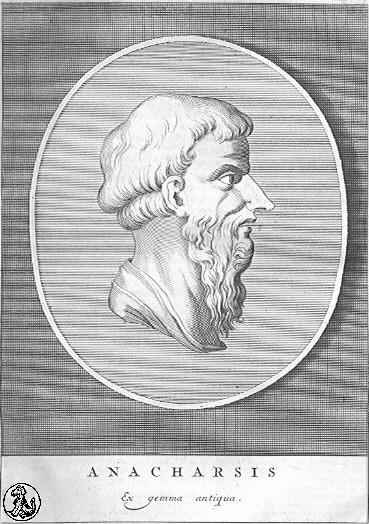“Ma patrie me fait honte, et toi tu fais honte à la tienne.”
À un Grec lui reprochant d’être un Scythe.
Anacharsis est un philosophe d’origine « barbare » puisque venu en Grèce du peuple des Scythes au nord de la mer Noire au début du VIe siècle av. J.-C. Il est parfois rangé parmi les Sept sages. Il ne reste aucun texte de lui hormis des traditions indirectes. Ce personnage presque légendaire représente l’étranger avisé, le « regard du dehors » dans la civilisation hellénique, une sorte de préfiguration de la perspective des cyniques mettant à distance les mœurs habituelles de la Cité. Wikipedia

“Ma patrie me fait honte, et toi tu fais honte à la tienne.”
À un Grec lui reprochant d’être un Scythe.
Discussing Solon's laws with him, as quoted by Plutarch, in Solon ch. 5; translation by Robin Waterfield from Plutarch Greek Lives (1998) p. 50.
Variants:
Written laws are like spiders’ webs; they will catch, it is true, the weak and poor, but would be torn in pieces by the rich and powerful.
Laws are spider-webs, which catch the little flies, but cannot hold the big ones.
as quoted in Beeton's Book of Jokes and Jests, or Good Things Said and Sung, Second Edition, Printed by Frederick Warne & Co., London, 1866.
“My country is a disgrace to me, but you are a disgrace to your country.”
On being insulted by an Athenian for being a Scythian, as quoted in The Lives and Opinions of Eminent Philosophers by Diogenes Laërtius, as translated by C. D. Yonge, (1853), "Anacharsis" sect. 5, p. 48
“Better to have one friend of great value, than many friends who were good for nothing.”
As quoted in The Lives and Opinions of Eminent Philosophers by Diogenes Laërtius, as translated by C. D. Yonge, (1853), "Anacharsis" sect. 5, p. 48
“The forum [is] an established place for men to cheat one another, and behave covetously.”
As quoted in The Lives and Opinions of Eminent Philosophers by Diogenes Laërtius, as translated by C. D. Yonge) (1853), "Anacharsis" sect. 5, p. 48
“Under which head do you class those who are at sea?”
Having been asked whether the dead or the living were more numerous., as quoted in The Lives and Opinions of Eminent Philosophers by Diogenes Laërtius, as translated by C. D. Yonge, (1853), "Anacharsis" sect. 5, p. 48
“A view of the unseemly actions of drunken men is the most effectual dissuasive from wine.”
As quoted in Diogenes Laertius, The Lives and Opinions of Eminent Philosophers, Chapter "Life of Anacharsis", 1702 edition, John Nicholson, p. 55
As quoted in Diogenes Laertius, The Lives and Opinions of Eminent Philosophers, Chapter "Life of Anacharsis", 1702 edition, John Nicholson, p. 55.
Source: [Diogenes Laërtius, Diogenes_Laërtius, The Lives of the Ancient Philosophers: Containing an Account of Their Several Fects, Doctrines, Actions and Remarkable Sayings..., http://books.google.com/books?id=SQrULxU3TXMC, 4 September 2013, 1702, John Nicholson, 54, Life of Anarchasis]